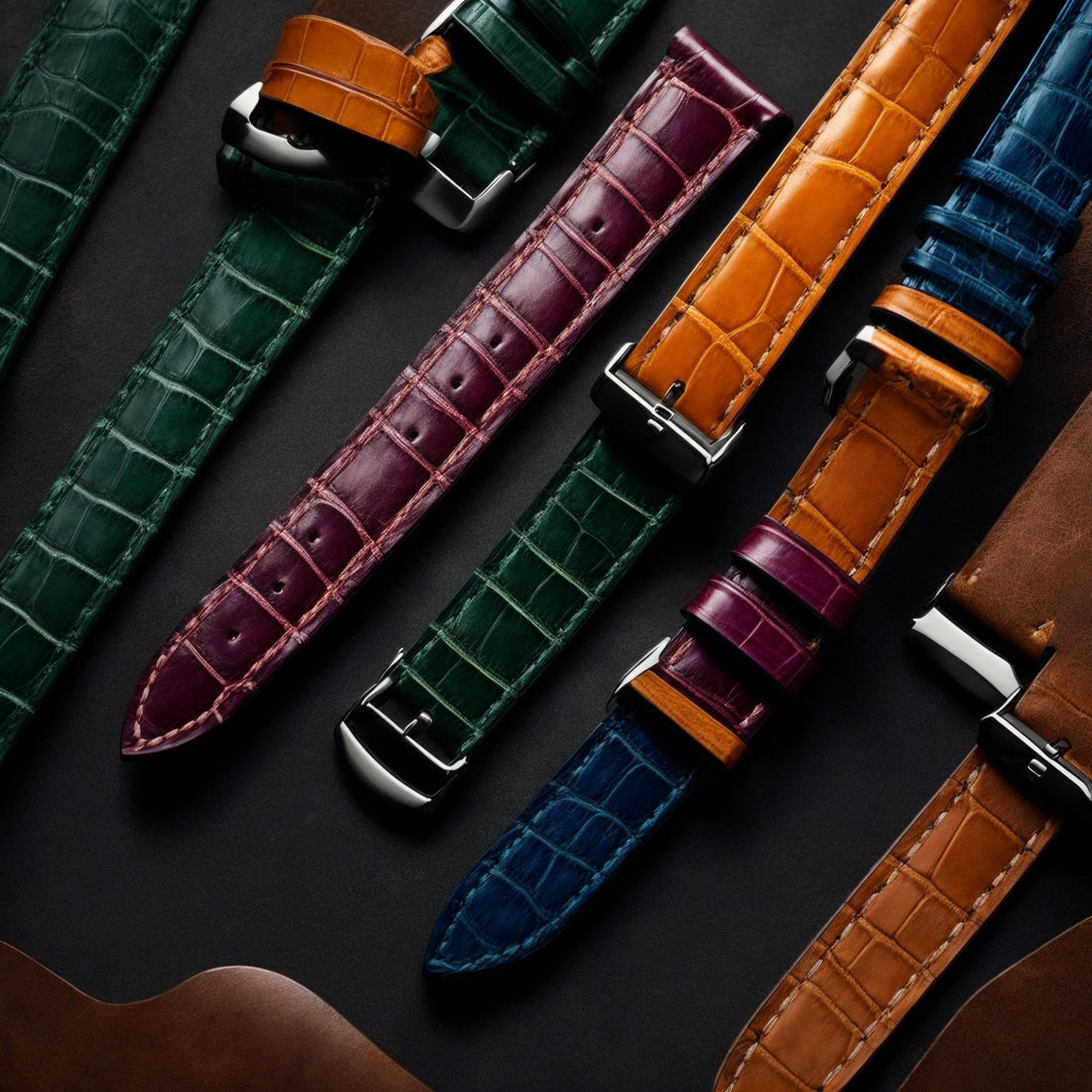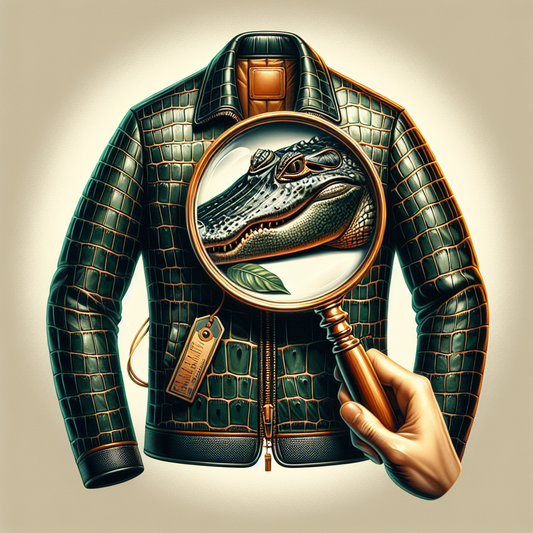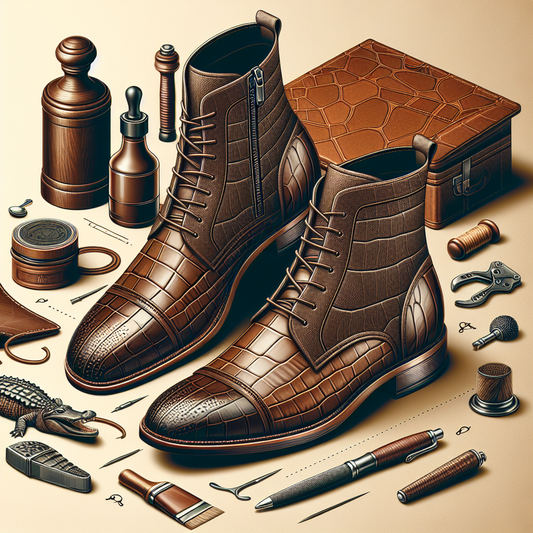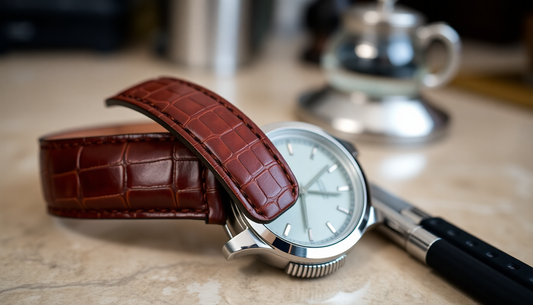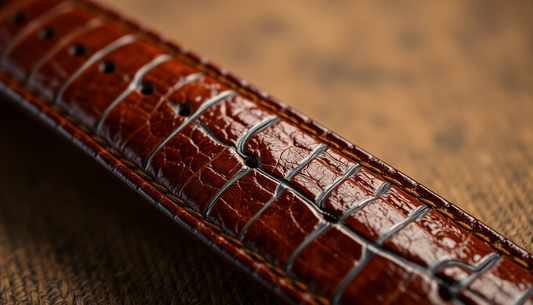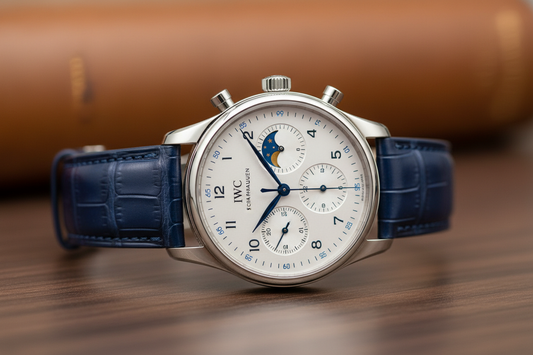Why alligator leather is a luxury
In the world of luxury, certain materials stand out. Alligator leather is one such material.
Known for its unique texture and pattern, alligator leather is a symbol of elegance and exclusivity. It's a material that's often associated with high-end fashion items, such as watch straps, handbags, and shoes.
But what makes alligator leather a luxury?
The answer lies in its rarity, the intricate process of crafting it, and the skilled craftsmanship required. Genuine alligator leather has distinct features that set it apart from other leathers.
In this article, we delve into the world of alligator leather. We explore why it's considered a luxury, how to identify genuine alligator leather, and its role in the luxury watch industry.
Whether you're a luxury accessory enthusiast, a potential buyer of high-end leather goods, or simply curious, this guide will provide you with valuable insights.
The Rarity and Exclusivity of Alligator Leather
Alligator leather is a product of nature, and as such, it's inherently rare. The skins used for leather production come from alligators that are ethically sourced, adding to the exclusivity of the material.
The rarity of high-quality alligator skins significantly contributes to its luxury status. Each alligator skin has a unique pattern, ensuring that no two alligator leather products are exactly alike. This uniqueness is a hallmark of luxury, where individuality and distinction are highly valued.
Moreover, the alligator leather industry adheres to strict regulations to ensure sustainability and animal welfare. This ethical sourcing further enhances the exclusivity of alligator leather, as it aligns with the values of conscious luxury consumers.
In conclusion, the rarity and exclusivity of alligator leather are key factors in its luxury status. It's a material that's not only visually striking and durable but also ethically sourced and unique. This combination of qualities makes alligator leather a premium choice in the world of luxury fashion.
The Art of Crafting Alligator Leather
The process of turning alligator skin into leather is a testament to skilled craftsmanship. It's a complex procedure that requires precision, patience, and a deep understanding of the material.
The first step in the process is the careful removal of the alligator's skin. This is followed by a thorough cleaning to remove any residual flesh or fat. The skin is then soaked in a tanning solution to prevent decay and to enhance its durability.
The tanning process also helps to bring out the unique texture and pattern of the alligator skin. After tanning, the leather is dried, conditioned, and finished to achieve the desired color and sheen.
- The crafting process includes:
- Removal of the skin
- Cleaning
- Tanning
- Drying
- Conditioning
- Finishing
This intricate process, coupled with the skill required to execute it, contributes to the luxury status of alligator leather. It's not just about the material itself, but also about the artistry and effort that goes into transforming it into a finished product.
Identifying Genuine Alligator Leather
Identifying genuine alligator leather can be a challenge, especially for the untrained eye. However, there are certain features that can help distinguish it from imitations.
Genuine alligator leather has a distinct tile pattern that is unique to each individual alligator. This pattern is characterized by a series of rectangular scales that are organized in regular rows. Another distinguishing feature is the presence of umbilical scars, which are small, circular marks found on the belly of the alligator.
- Key features of genuine alligator leather:
- Unique tile pattern
- Umbilical scars
These features are not found in faux alligator leather or other types of reptile leather. Therefore, they serve as reliable indicators of authenticity. Understanding these characteristics can help ensure that you are investing in a genuine alligator leather product.
Alligator Leather in High-End Fashion: From Watch Straps to Handbags
Alligator leather has long been a staple in the world of high-end fashion. Its unique texture and pattern make it a sought-after material for a variety of luxury items.
One of the most popular uses of alligator leather is in the creation of watch straps. The durability and distinct look of the leather add a touch of sophistication and elegance to any timepiece. Brands like Rolex and Patek Philippe often use alligator leather straps for their luxury watches (alligator leather strap watch).
But the use of alligator leather is not limited to watch straps. It is also commonly used in the production of luxury handbags, wallets, and shoes. Brands like Gucci, Prada, and Louis Vuitton have all released products made from alligator leather.
The versatility and enduring appeal of alligator leather make it a favorite among fashion designers and consumers alike. Whether it's a watch strap, a handbag, or a pair of shoes, alligator leather adds a touch of luxury to any item.
The Ethical Sourcing and Sustainability of Alligator Leather
The luxury status of alligator leather is not just about its unique aesthetic and durability. It's also about the ethical sourcing and sustainability practices behind its production.
Alligator farms must adhere to strict regulations to ensure the welfare of the animals and the sustainability of the industry. These regulations include maintaining a certain standard of living conditions for the alligators and implementing humane slaughtering practices.
Moreover, the alligator leather industry contributes to the conservation of alligator populations. By providing a financial incentive for their preservation, it discourages illegal hunting and promotes sustainable use of the species. This balance between luxury and sustainability is part of what makes alligator leather such a prized material in the fashion industry.
The Role of Alligator Leather in Luxury Watchmaking
Alligator leather plays a significant role in the world of luxury watchmaking. Its unique texture and durability make it a preferred choice for watch straps.
High-end watch brands often collaborate with skilled artisans to create alligator leather watch straps. These straps are not only aesthetically pleasing but also comfortable and long-lasting. The intricate patterns of alligator leather add a touch of sophistication to the watch, enhancing its overall appeal.
Moreover, the use of alligator leather in watchmaking is not just about aesthetics. It's also about the tactile experience. The feel of alligator leather against the skin is unlike any other material, adding to the luxury experience of wearing a high-end watch.
The variety of styles and designs available in alligator watch straps also contributes to their popularity. From classic black or brown to vibrant colors and unique finishes, there's an alligator leather watch strap to suit every taste and style.
Caring for Your Alligator Leather Goods
Proper care and maintenance are crucial to ensure the longevity of your alligator leather goods. This exotic material requires specific care to maintain its unique texture and luster.
Here are some tips to care for your alligator leather items:
- Avoid exposing the leather to direct sunlight or heat, which can cause it to dry out and crack.
- Clean the leather regularly with a soft, dry cloth to remove dust and dirt.
- Use a specialized leather conditioner to keep the leather hydrated and prevent cracking.
- Store your alligator leather items in a cool, dry place when not in use.
- Avoid using harsh chemicals or abrasive materials on the leather, as they can damage its surface.
The Future of Alligator Leather in the Luxury Market
The future of alligator leather in the luxury market looks promising. As consumers continue to value quality, craftsmanship, and exclusivity, the demand for alligator leather is expected to rise.
Technological advancements in tanning and treating alligator leather are also opening up new possibilities. These innovations are enhancing the durability and versatility of alligator leather, making it an even more appealing choice for luxury goods.
However, the industry must continue to address ethical and environmental concerns. Transparency in sourcing and production, adherence to animal welfare standards, and efforts towards sustainability will be key to maintaining consumer trust and ensuring the long-term viability of the alligator leather market.
Conclusion: The Enduring Appeal of Alligator Leather Luxury
Alligator leather continues to hold a special place in the world of luxury. Its unique texture, durability, and the craftsmanship required to transform it into high-end products contribute to its enduring appeal.
As long as the industry continues to uphold ethical and sustainable practices, alligator leather will remain a symbol of luxury and exclusivity. Its future looks bright, with potential for further innovation and growth in the luxury market.


